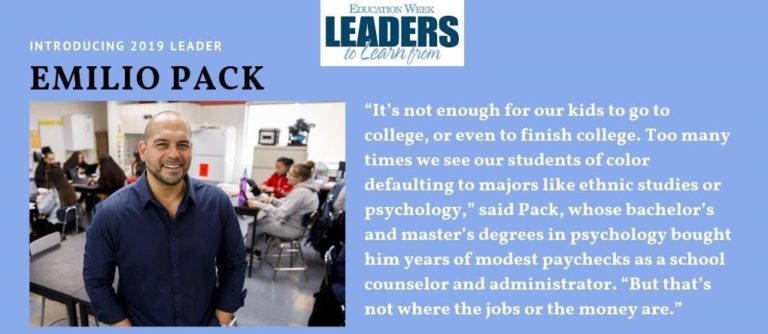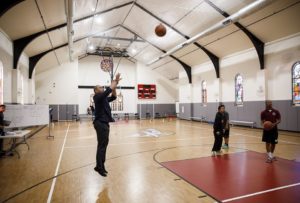
When running a charter school network feels like a huge pileup of paperwork and policy, and Emilio Pack loses his way a little, he glances at a picture of himself in elementary school.
He’s a chubby kid in homemade plaid overalls, still learning English, a true outsider at a school full of rich white kids in designer clothes.
Seeing that photo zaps him full of renewed energy and purpose. Pack, 50, is running three science and technology charter schools, in a neighborhood of working-class immigrants, to give these children something he didn’t have: good choices right in their own neighborhood; schools with the power to lift them out of poverty.
Here, between the churches and check-cashing shops, Pack has built a sort of protective pipeline: an elementary, middle, and high school that aim to transform sneakered, Latino and African-American children into the high-tech problem-solvers of tomorrow, with college degrees and white-collar paychecks.
Not just any college degree is good enough for Pack’s students, though. And when he tells you why, his explanation is Essential Emilio: it blends a studied command of education and job pathways with relentlessly lofty goals and his own bittersweet life experience.
“It’s not enough for our kids to go to college, or even to finish college. Too many times we see our students of color defaulting to majors like ethnic studies or psychology,” said Pack, whose bachelor’s and master’s degrees in psychology bought him years of modest paychecks as a school counselor and administrator. “But that’s not where the jobs or the money are.”
LESSONS FROM THE LEADER
- College Degrees Aren’t Equal: Bachelor’s degrees in science, engineering, technology, and math fields offer students a strong shot at good-paying jobs in fast-growing fields. They also contribute to diversifying job sectors that are disproportionately white.
- Lead With Love and Respect: Leadership is built on love and respect for students, teachers, and staff, and a full investment in their growth.
- Follow Core Values:They have to be your guiding lights and inform your decisions every day about hiring, curriculum, student discipline.
Pack’s big project is just beginning. The high school, Math and Science College Prep, which opened in 2013, has had time to produce only two classes of graduates. The STEM Preparatory network added a middle school, Crown Preparatory Academy, in 2015, and a primary school, STEM Prep Elementary, in 2018.
But early results are promising. His students are outperforming those at the nearby schools they would otherwise have attended. More than three quarters of the high school’s graduates have enrolled in four-year colleges—a stunning achievement in a neighborhood of Spanish-speaking immigrants who work in factories and restaurants—and most have declared majors in science, technology, engineering, and math fields.
Forged by Hardship
The families Pack serves are like the one that forged him. He was born in a Los Angeles neighborhood tougher than this one, three months after his single mother arrived from Cuba in 1968. Lourdes Pack had been a dentist in Cuba, but lacked the credentials to practice when she came to the United States.
To pay the bills, she ran a black-market dental practice in the bathroom of the small apartment she shared with her son. She saved enough to buy a small house in San Marino, one of the city’s richest suburbs, so she could send her son to 1st grade at its famously top-tier schools.
But Pack didn’t fit in. Classmates in Lacoste shirts made fun of the overalls his grandmother sewed him, and of his Spanish accent.
Despite the hardships of those years, Lourdes Pack saw nothing but opportunity in her American life. She taught her son that every problem has a solution. That view would define the rest of his life, burnishing him into a can do guy with an easy smile and a desire to make other people’s lives better.
Pack became a social worker and middle school counselor, then an assistant principal and principal at regular public schools around Los Angeles. He switched to the charter world in 2005, opening a series of schools for the Alliance College-Ready charter network.
Along the way, he earned a doctorate in education, and joined the faculty of Loyola Marymount University, where he designed leadership and talent development strategies and launched a certification program for charter school leaders.
With all of that under his belt, Pack set out to open the first of the three STEM Preparatory schools. He encountered little of the often-fiery opposition that marks this city as a major battleground for charter-school expansion. It’s a remarkable feat colleagues attribute to Pack’s résumé of hard work in schools, and his signature blend of advocacy and diplomacy.
 Emilio Pack plays basketball with STEM Preparatory High School students in South Los Angeles. Pack aims to provide students a rigorous STEM education usually found in more affluent schools.
Emilio Pack plays basketball with STEM Preparatory High School students in South Los Angeles. Pack aims to provide students a rigorous STEM education usually found in more affluent schools.
—Patrick T. Fallon for Education Week
Pack and his team structured the school around an inquiry-driven approach, where students begin by wrestling with questions, and teachers play the role
of facilitators, guiding the process and adjusting instruction to respond to students’ needs. They blended their own curriculum with Project Lead The Way, a national program of STEM study, and adapted it to the inquiry-based model. They created three pathways for students: computer science, engineering, and biomedical studies. Subject-matter teachers work side by side with those from Project Lead The Way, infusing the entire K-12 curriculum with science and technology instruction.
A warm fall afternoon at the high school found computer-science students writing code for a new project and engineering students calculating the force of a winch. The biomedical students were analyzing blood results from a fictional corpse to solve a murder mystery.
On a sunny playground at the elementary school a mile and a half away, 3rd graders were flying cardboard gliders they had built. Keeping careful logs of 12 test flights, they had revised their planes’ designs to get them to fly farther. Looking up from under his mop of ebony curls, Isaiah said he expected his plane to fly farther since he’d moved the “horizontal stabilizer” back a bit to improve its “lift.” Experts in STEM instruction say there are many watered down versions in K-12 classrooms across the country, but Pack’s isn’t one of them.
Matt Bragman, who oversees the 200-plus Project Lead The Way Schools in Los Angeles County, said the STEM Prep schools have implemented the program with “unbelievable fidelity and rigor.”
“They’re doing real-deal STEM over there,” said Darryl Cobb, an electrical engineer who is a managing partner of the Charter School Growth Fund, which lends financial support to the STEM Prep schools. “The high school he’s running is the high school I wish I’d had.”
Too many times we see our students of color defaulting to majors like ethnic studies or psychology. But that’s not where the jobs or the money are.
Sticking to a rigorous program when many students’ academic skills are weak is no small challenge, though. The STEM Prep schools try to plug those gaps with intervention classes and tutors. They’ve also invested heavily in counseling for their 1,150 students: There are five full- or part-time counselors handling social-emotional issues, and six overseeing career and college planning.
Even still, academic growth is a work in progress. The STEM Prep schools do better than others nearby, but proficiency rates on state tests in some grades often hover in the 30-percent range, and scores have bounced around, sometimes far above, and other times below district and state averages.
Myrna Castrejón, the CEO of the California Charter Schools Association, said that the “long-term power of what Emilio can do” outweighs any “one-year blip” in his schools’ test scores. Pack is breaking important ground by giving low-income, Latino children the kinds of schools typically found in wealthy suburbs, she said.
Much of Pack’s power derives from the way he hires his staff. He recruits aggressively and nationally, exploiting all corners of his professional network to hunt down promising candidates. He and his team have carefully designed interview questions to identify teachers who see his students’ potential, not just their challenges, and want to join a “family” to serve and support them.
Once he’s got that family in place, Pack’s leadership style is highly collaborative; Castrejón describes him as a “come-along guy, not a scorched earth guy.” When there’s a problem, he turns to teachers for the solution. —Patrick T. Fallon for Education Week
Math teacher Josh Kronz, one of Pack’s original hires, recalled how he and a few colleagues approached the CEO to discuss what they saw as weak instructional skills in some of the more recently hired teachers.
Pack’s response was to do what he frequently does: he formed a “teacher task force” to hear out the problem fully. Together, they revised the hiring protocol, writing new interview questions and designing a model lesson that would better reveal candidates’ instructional styles.
“He’s the first one to say that we are the experts in teaching. He gives us that respect,” Kronz said.
‘Ultimate Motivator’
Teachers describe Pack as unfailingly supportive, popping into their classrooms to see how it’s going and what they need. They call him by his first name. They have his cell number, and know they can use it.
“For him there’s never a no,” said Johana Parker, an 18-year veteran who joined STEM Prep’s first crew of elementary school teachers. “If you need something, with him it’s not ‘We’ll see.’ It’s ‘We’ll make it happen.’ He’s the ultimate motivator.”
Even as he supervises a staff of 150, Pack finds time to nourish personal connections with students and staff members. Teachers say he and his wife, Janette Rodriguez-Pack, the network’s chief academic officer, regularly turn up at teachers’ barbecues, and “make all of us feel like family.”
Jessica Hernandez, 18, who’s majoring in public health as a sophomore at the University of California-Merced, said Pack intervened repeatedly to help her get scholarships and arrange an internship at an accounting firm when she was building a record for college admission at Math and Science College Prep.
“I wouldn’t have been able to do half the things I’m doing now without Dr. Pack,” said Hernandez. Her mother runs a mini-market and her father is a sewing contractor, and she worried she wouldn’t be able to afford college.
Stories like those are what keep Pack going, says his childhood friend, Stephan Pastis.
“Sometimes he’ll talk about one of his kids and what they’ve accomplished, and he’s on the verge of tears,” Pastis said. “He has that pride, almost as if it was his own kid.”
Librarian Maya Riser-Kositsky contributed research for this report.
